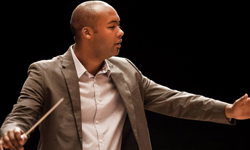New conductor of OSM Camerata is one of South Africa’s most successful young people
|

Mr Xavier Cloete
|
The OSM Camerata at the University of the Free State boasts with a young renowned conductor to lead them in the next season.
Mr Xavier Cloete, winner of the 2013 National Len van Zyl Conductor’s Competition, will conduct the Camerata during the Odeion School of Music’s opening concert.
He completed his BMus degree at the University of Stellenbosch in 2011 with bassoon and orchestral conducting as main instruments and is currently employed by the KwaZulu-Natal Philharmonic Orchestra (KZNPO).
As winner of the Len van Zyl Competition, he completed a conducting internship with the famous Philadelphia Orchestra, which gave him the opportunity to work with acclaimed conductors. He also studied at the Bienen School of Music (Northwestern University) in the Advanced Graduate Conducting Class of Prof Victor Yampolski.
Last year Xavier was also invited to attend the first Sasha Mäkilä International Master Classes in Finland.
His love and passion for music started early in his life – and somewhat coincidentally - in church.
“I was learning to play a few hymns on my dad’s Hammond organ at home. One Sunday our church organist didn’t turn up and I nonchalantly moved in behind the organ. It went very well.”
Xavier ascribes his success to lots of hard work and his love for music.
“My passion for music drives me to work hard. Hard work shows that you are dedicated and this is again seen in the successes you achieve. The reward of one’s hard work is the best instrument.”
He will be making his international debut with the St Michel’s City Orchestra (Finland) during April 2014.